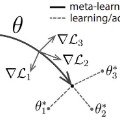Recent advances in Federated Learning (FL) have paved the way towards the design of novel strategies for solving multiple learning tasks simultaneously, by leveraging cooperation among networked devices. Multi-Task Learning (MTL) exploits relevant commonalities across tasks to improve efficiency compared with traditional transfer learning approaches. By learning multiple tasks jointly, significant reduction in terms of energy footprints can be obtained. This article provides a first look into the energy costs of MTL processes driven by the Model-Agnostic Meta-Learning (MAML) paradigm and implemented in distributed wireless networks. The paper targets a clustered multi-task network setup where autonomous agents learn different but related tasks. The MTL process is carried out in two stages: the optimization of a meta-model that can be quickly adapted to learn new tasks, and a task-specific model adaptation stage where the learned meta-model is transferred to agents and tailored for a specific task. This work analyzes the main factors that influence the MTL energy balance by considering a multi-task Reinforcement Learning (RL) setup in a robotized environment. Results show that the MAML method can reduce the energy bill by at least 2 times compared with traditional approaches without inductive transfer. Moreover, it is shown that the optimal energy balance in wireless networks depends on uplink/downlink and sidelink communication efficiencies.
翻译:多任务学习(MTL)进程分两个阶段进行:优化能够迅速适应学习新任务的元模型,以及一个具体任务模式适应阶段,将所学的元模型转移到代理商,并适合具体任务。这项工作分析影响MTL能源平衡的主要因素,考虑在机器人化环境中设置多任务强化学习(RL),从而在无线化环境中建立多任务强化学习(RL)。 研究结果显示,MTML方法可以减少能源平衡,而与传统通信链相比,在最保守的通信链中,最不取决于无线通信链。



